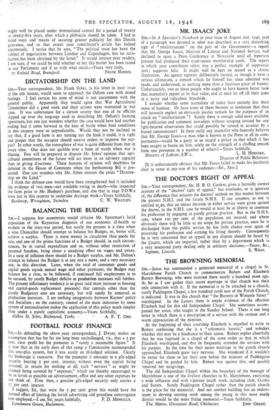BALANCING THE BUDGET
Sitt,—I suppose few economists would criticise Mr. Spearman's lucid exposition of the Keynesian diagnosis of our economic ill-health so evident in the inter-war period, but surely the present is a time when a wise Chancellor should attempt to balance his Budget, or, better still, achieve a surplus. There is more money in circolation than goods for sale, and one of the prime functions of a Budget should, in such circum- stances, be to curtail expenditure and so, without other restriction of personal freedom, bring about a steadying effect on wages and prices. In a state of inflation there should be a Budget surplus, and Mr. Dalton's attempt to balance the Budget is at any rate a move, and a very necessary one, in this direction. Later, when the total of consumer goods and capital goods equals annual wage and other payments, the Budget may balance for a time, to be followed, if continued full employment is to be secured, by yearly Budget deficits as prodnetion increases still further. The present inflationary tendency is so great (and must increase as-housing and capital-goods replacement proceeds) that controls other than the purely Budgetary one are necessary, but will surely be removed as production increases. I see nothing antagonistic between Keynes' policy. and Socialism ; on the contrary, control of the main industries by some system of nationalisation makes the application of this policy much simpler than under a purely capitalistic economy.—Yours faithfully,


























 Previous page
Previous page